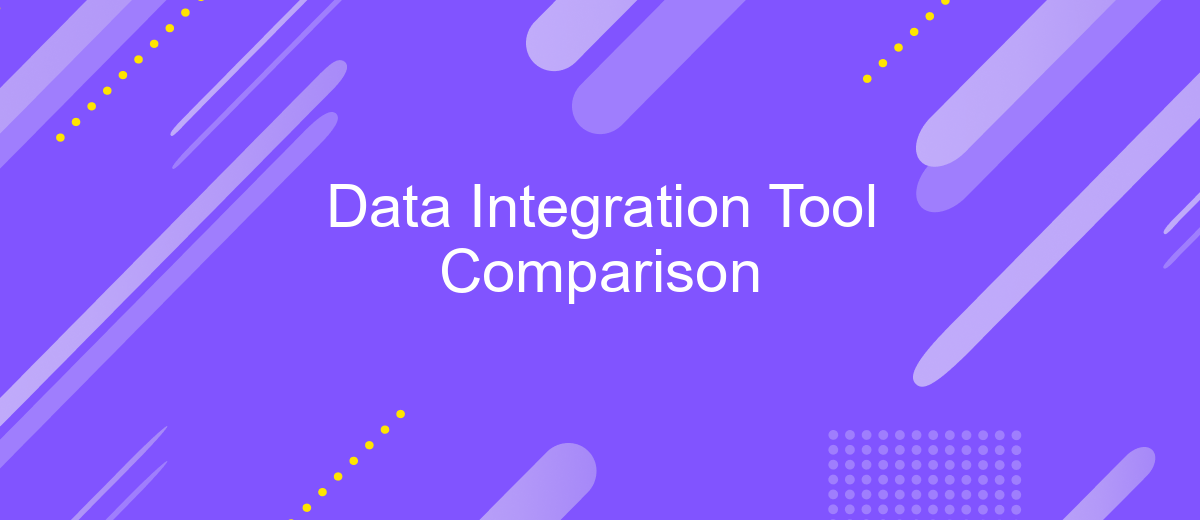Data Integration Tool Comparison
In today's data-driven world, businesses rely heavily on efficient data integration tools to streamline operations and make informed decisions. This article provides a comprehensive comparison of leading data integration tools, evaluating their features, scalability, and ease of use. By understanding the strengths and weaknesses of each tool, organizations can choose the best solution to meet their unique data integration needs.
Introduction
Data integration is a critical aspect for businesses aiming to consolidate information from various sources into a unified view. It enables seamless data flow across different applications and platforms, enhancing decision-making and operational efficiency. Selecting the right data integration tool can be challenging due to the variety of options available, each with its unique features and capabilities.
- Ease of use and setup
- Scalability and performance
- Compatibility with existing systems
- Cost-effectiveness
- Support and documentation
One such tool that stands out in the market is ApiX-Drive. It offers a user-friendly interface and robust integration capabilities, making it easier for businesses to connect disparate systems without extensive technical expertise. By leveraging tools like ApiX-Drive, organizations can streamline their data integration processes, ensuring that data is accurate, timely, and readily accessible for strategic initiatives.
Key Features

When comparing data integration tools, it's crucial to consider their key features. A robust data integration tool should offer seamless connectivity to a wide range of data sources, including databases, cloud services, and on-premises systems. Real-time data synchronization is another essential feature, ensuring that data remains consistent and up-to-date across all integrated platforms. Additionally, user-friendly interfaces and drag-and-drop functionality can significantly enhance the ease of use, allowing even non-technical users to set up and manage integrations effectively.
Another critical aspect is the tool's ability to handle complex data transformations and workflows. Advanced features like automated error handling, data mapping, and customizable workflows can streamline the integration process. Security is also paramount; look for tools that offer robust encryption and compliance with industry standards. Services like ApiX-Drive excel in these areas, providing a comprehensive solution for automating data transfers and integrations with minimal manual intervention. Their platform supports a wide array of applications and offers real-time synchronization, making it a valuable asset for any organization looking to optimize its data integration strategy.
Benefits

Data integration tools offer numerous advantages for businesses aiming to streamline their data management processes. These tools enable seamless data flow between various systems, ensuring that information is consistent and up-to-date across all platforms.
- Enhanced Efficiency: Automated data integration reduces manual data entry, saving time and minimizing errors.
- Improved Data Quality: Consistent data updates across systems prevent discrepancies and ensure data accuracy.
- Scalability: Tools like ApiX-Drive can easily scale with your business needs, handling increasing data volumes effortlessly.
- Cost Savings: By reducing the need for manual data handling, businesses can lower operational costs and allocate resources more effectively.
- Better Decision-Making: Real-time data integration provides up-to-date information, enabling more informed business decisions.
Incorporating a tool like ApiX-Drive into your data integration strategy can significantly enhance your operational efficiency. ApiX-Drive offers user-friendly interfaces and robust integration capabilities, making it easier to connect various platforms without extensive technical knowledge. This allows businesses to focus more on strategic growth rather than getting bogged down by data management challenges.
Drawbacks

While data integration tools offer numerous benefits, they also come with their own set of drawbacks. One of the primary issues is the complexity involved in setting up and maintaining these tools. Users often need to possess a certain level of technical expertise to effectively manage integrations, which can be a barrier for smaller businesses or teams with limited IT resources.
Another significant drawback is the cost associated with many data integration tools. High licensing fees and ongoing subscription costs can add up quickly, making it difficult for budget-conscious organizations to justify the investment. Additionally, some tools may require costly customizations to meet specific business needs.
- Complex setup and maintenance
- High licensing and subscription costs
- Potential need for expensive customizations
- Limited support for niche applications
While services like ApiX-Drive aim to simplify the integration process, they are not without their limitations. For instance, ApiX-Drive supports a wide range of applications but may not cover every niche software a business uses. Therefore, it's crucial to carefully evaluate the specific needs and constraints of your organization before committing to a particular data integration tool.
- Automate the work of an online store or landing
- Empower through integration
- Don't spend money on programmers and integrators
- Save time by automating routine tasks
Conclusion
In conclusion, selecting the right data integration tool is crucial for ensuring seamless data flow and operational efficiency. Each tool offers unique features and capabilities, making it essential to evaluate them based on your specific business needs. Factors such as ease of use, scalability, and compatibility with existing systems should be considered to make an informed decision.
For businesses seeking a user-friendly and versatile solution, ApiX-Drive stands out as a reliable option. Its ability to integrate various applications without requiring extensive technical expertise makes it accessible for teams of all sizes. By leveraging such tools, organizations can optimize their workflows, reduce manual data handling, and ultimately drive better business outcomes.
FAQ
What is a data integration tool?
Why is data integration important for businesses?
What factors should be considered when comparing data integration tools?
How can businesses automate data integration processes?
What are the benefits of using a cloud-based data integration tool?
Apix-Drive will help optimize business processes, save you from a lot of routine tasks and unnecessary costs for automation, attracting additional specialists. Try setting up a free test connection with ApiX-Drive and see for yourself. Now you have to think about where to invest the freed time and money!


